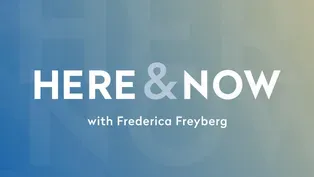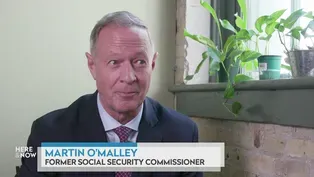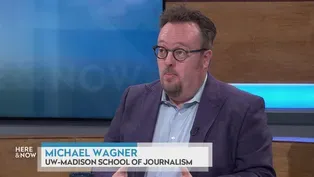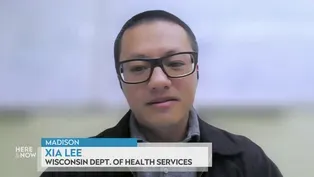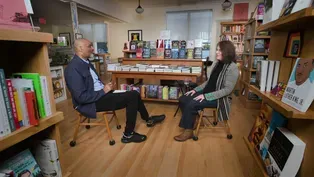Here and Now
US Rep. Tom Tiffany on Tariffs, Funding Cuts and Immigration
Clip: Season 2300 Episode 2341 | 12m 38sVideo has Closed Captions
Tom Tiffany on the Trump administration's actions on tariffs, spending cuts and visas.
U.S. Rep. Tom Tiffany, R-7th Congressional District, discusses the Trump administration's actions on setting and changing tariffs, spending cuts on personnel and programs, and revoking student visas.
Problems with Closed Captions? Closed Captioning Feedback
Problems with Closed Captions? Closed Captioning Feedback
Here and Now is a local public television program presented by PBS Wisconsin
Here and Now
US Rep. Tom Tiffany on Tariffs, Funding Cuts and Immigration
Clip: Season 2300 Episode 2341 | 12m 38sVideo has Closed Captions
U.S. Rep. Tom Tiffany, R-7th Congressional District, discusses the Trump administration's actions on setting and changing tariffs, spending cuts on personnel and programs, and revoking student visas.
Problems with Closed Captions? Closed Captioning Feedback
How to Watch Here and Now
Here and Now is available to stream on pbs.org and the free PBS App, available on iPhone, Apple TV, Android TV, Android smartphones, Amazon Fire TV, Amazon Fire Tablet, Roku, Samsung Smart TV, and Vizio.
Providing Support for PBS.org
Learn Moreabout PBS online sponsorship>> What does the Republican congressional delegation in Wisconsin think about changing tariffs, federal spending cuts, and tough new immigration orders?
We ask seventh congressional district U.S. Representative Tom Tiffany who joins us from Minocqua.
Congressman, thanks very much for being here.
>> Good to join you today, Frederica.
>> So you have long called out China for unfair trade practices.
President Trump had imposed a 145% tariff on China.
What's your reaction to the president now talking about pulling back from that?
>> You know, I think he came out with really broad-based tariffs initially, and now is the part where there is negotiation going on.
And so we will see where this all leads.
All I know is that I just introduced a bill about a week ago in regards to the World Trade Organization.
I think we should have a vote in Congress whether we should continue to belong to one of these multinational organizations like the World Health Organization, in this case, the World Trade Organization, 'cause I don't think it served America's interest.
I think it served the interests of China and as we've seen main streets across Wisconsin and America get hollowed out, part of that is because we've given up making things here in America.
We gotta bring some of that manufacturing back here to the United States.
>> As to tariffs, how hard is it to keep up with them moving around so much?
>> Yeah, there's a lot of moving parts that's been going on.
My understanding is there's about 60 to 75 countries that are in active negotiations.
And so while you know the elephant in the room is China, there's so many other countries that there are active negotiations that are going on.
Here's my hope at the end, Frederica, when the dust settles, is that we're going to see lower tariffs across the table around the world as a result of this negotiation.
I think the threat of higher tariffs may be able to get some countries to say, "Okay, maybe we're better off with a lower tariff regime," because ultimately that would be the best for the world.
>> How long do you think it will take for the dust to settle, given the repercussions that we've seen?
>> Yeah, I don't have any prediction there, but you would hope over the next couple months that with these active negotiations going on, that we're gonna see some good things happen.
I can tell you there's a couple things really germane to Wisconsin that I'm watching closely.
One, China has used ginseng and the ginseng farmers as a political football.
I'm really hoping our trade representative, and I've passed this message on to him, that, for example, ginseng, tell China to stop using that as a political weapon.
>> Because those ginseng farmers are right now facing some really unpredictable and difficult markets.
>> Yeah, there's no doubt about it.
China has done this before.
They did it in the Trump's first administration.
And I would also point out Canada.
Canada has dairy tariffs that are over 200% at times.
I mean that has a real harmful effect to America, but especially America's dairyland.
>> Well, what kind of feedback have you been getting from your constituents about Elon Musk's DOGE cuts to federal programs and personnel?
Everything from the USDA, to the VA, Social Security, even the CDC now unable to help Milwaukee with its lead crisis.
>> You know, I would say both on the issue of tariffs and DOGE, the Department of Government Accountability, that it leads to uncertainty and, you know, we all prefer to have stability in our lives, especially when it comes to our finances.
And, but it's important what is going on to have some fiscal responsibility.
Congress has not done its job over the last 30 years really making sure how these expenditures that are going out, that they're going out appropriately.
Now we've finally gotten to the point with $36 trillion in debt, somebody has to do something about it.
And to the credit of the Trump administration, they are saying, "We're gonna identify this stuff, and now, you Congress, gotta decide if you're going to have some, if you're going to engage in some fiscal responsibility.
>> What about Congress's role to kind of get a grasp of what has happened with DOGE and these kinds of cuts?
>> You know, we're watching very closely what they're identifying, 'cause ultimately DOGE does not make the decision.
It's the executive branch or Congress that makes the decision in regards to this.
And they should help guide some of the things that are out there that we can deal with.
I mean, I'll give you two really quick examples that are one small, one large.
$5,600 to water eight plants in a Department of Defense facility.
$5,600 to water eight plants.
That's crazy.
$200 billion in duplicate payments that went out via the Medicaid program to insurers.
Those type of things really need rigorous review.
So there's ways large and small.
We need to do a better job in Congress of going through these line items line by line.
>> If the DOGE cuts don't offset enough spending, how will the GOP budget get the spending cuts needed to prevent Donald Trump's 2017 tax cuts from deepening the deficit?
>> One of the things we did in the House, and in particular those of us that are members of the Freedom Caucus, we wanted to couple additional tax reductions to deficit reduction.
So to a certain extent, we will not get additional tax savings or tax reductions unless we find those spending reductions.
And I think it was appropriate to couple those two things to a certain extent.
>> So as to spending reductions, would you vote for a budget that had cuts to Medicaid?
>> Only if they're done appropriately.
I just identified for you $200 billion in duplicate payments that went out over a course of a number of years, a few years back to insurers that were involved with the Medicaid program.
That should not be happening.
The other thing that I've been a strong advocate for is for work requirements.
If you are able bodied and you can work and you're taking Medicaid, in other words you're accepting getting your health care from your fellow taxpayers when you could have your own job?
I believe work requirements should be put in place and I think that's one place that we could save billions of dollars with the Medicaid program.
>> So what's your comment on the Universities of Wisconsin already losing millions in research funds with a threat of tens of millions of dollars more?
>> Well make the case, make the case, because I mean, for example, the Bureau of Indian Affairs, their facility up in my district in Ashland was on the chopping block to close that facility.
They made their case and the administration restored it.
That's an example of make the case of why that research is so important and I think you will see this administration be very open to restoring that.
The other thing that I would mention is there was a specific example in UW-Madison where 55% of a grant went for indirect costs.
When you look at the leading research grantees like the Gates Foundation, Johnson, others like that, they put a cap of 15% on indirect costs.
I think something like that similarly should be done at the federal level with these federal grants 'cause we want good research done.
UW-Madison does great research, WARF does great research, but the taxpayers should have some accountability for those dollars going out.
>> The UW-Madison says in terms of those indirect costs and the reduction of money that would go toward those potentially, that's in court right now, would really hamper the research because it goes to things like building labs and maintaining labs, and the infrastructure that's needed to do the research, just having spoken with them.
>> Yeah, I would just say, if, yeah, if they think it's vital, they should make the case because this administration will listen as the example I gave to you in regards to the BIA facility in Ashland and there's other examples going on around the country.
Make the case of why that money should be funded and I think the administration will listen very closely to the case they wanna make.
>> Meanwhile, as to the UW, some 40 international students have had their visas revoked.
Officials with the university say that it doesn't appear that that had anything to do with any kind of political activity on the part of those international students.
Do you support those removals and revocations?
>> You know, I would wanna see the specific examples because I have not dug into these, Frederica, to see what their background is, but it's clear that there's been students around the country that have abused the privilege of being here in this country.
And that is what it is to get a green card to come into this country.
It is a privilege to be here.
It is not a right.
And so I think there should be a certain code of conduct that they should comply to.
And if they're doing things that are undermining the United States of America, as we've seen in a couple examples, where, for example, there's been intellectual property theft or if there has been violent antisemitic actions taken, it's a privilege to be here.
You don't have a right to be here in the United States.
>> Certainly, that's true.
We know the one most recent case, that was before a judge, the international student had a speeding ticket, and that was reportedly the basis for the revocation of their visa.
So, and it's difficult to kind of get in there and get the specifics on each case.
But on immigration, you've been super critical of Governor Evers for his guidance that he has given to state agencies around what to do in the event of ICE agents kind of showing up at a state building.
He suggests that people should notify a staff attorney, not give out paper files or computer access, not answer questions or allow ICE officers access to non-public areas.
So why so critical?
>> The governor is encouraging state employees to break federal law and as the leader of the state of Wisconsin, you should never, never do something like that where you're encouraging people to break federal law.
I mean, if you want to see something done differently, then advocate for doing something differently, but don't tell state employees that they should break the law.
>> How is it breaking the law?
>> If there has been a deportation notice that has been put out, it's ICE's job to remove that person and that is what should be happening, is that the person should be removed and Governor Evers is basically saying, "No, you're not, you are going to impede ICE from being able to do their job."
That is in defiance of federal law.
>> You're on the Judiciary Committee and many Republicans, including President Trump, have openly decried activist, liberal judges in maligning their rulings over executive orders and other things.
Does this fray the separation of powers?
>> No, it is our responsibility as the Judiciary Committee to make sure that we are doing proper oversight, not just over the administration, like the Department of Justice and the FBI, but also the judicial branch.
We write bills all the time that affect the judicial branch.
So I think it's appropriate.
But what's really disconcerting at this point is you have these activist judges that are out there issuing nationwide injunctions for what are narrow cases that affect just a few people.
I believe they're getting outside of their lane, they're overreaching the bounds of where they should be in carrying out their job as the judiciary.
>> All right, Congressman Tom Tiffany, we leave it there.
Thanks so much.
>> Good to join you, Frederica.
Here & Now opening for April 25, 2025
Video has Closed Captions
Clip: S2300 Ep2341 | 1m 2s | The introduction to the April 25, 2025 episode of Here & Now. (1m 2s)
How the 2025 NFL Draft in Green Bay Showcases Wisconsin
Video has Closed Captions
Clip: S2300 Ep2341 | 4m 12s | The 2025 NFL draft at Lambeau Field in Green Bay offers a chance to showcase the state. (4m 12s)
Martin O'Malley on Social Security Staff Reductions, Delays
Video has Closed Captions
Clip: S2300 Ep2341 | 1m 57s | Martin O'Malley on fundings cuts to Social Security staffing and frustration over delays. (1m 57s)
Michael Wagner on Federal Research Grant Cuts at UW-Madison
Video has Closed Captions
Clip: S2300 Ep2341 | 5m 51s | Michael Wagner on the termination of federal grants and consequences for researchers. (5m 51s)
Xia Lee on the Start of Wisconsin's Warm-Weather Tick Season
Video has Closed Captions
Clip: S2300 Ep2341 | 6m 21s | Xia Lee on risks of tick-borne diseases around Wisconsin and tips to avoid these pests. (6m 21s)
In Focus with Christine Wenc: America's Finest Satire Source
Video has Closed Captions
Clip: S2300 Ep2341 | 32m 30s | Christine Wenc on her book "Funny Because It's True" about the history of "The Onion." (32m 30s)
Providing Support for PBS.org
Learn Moreabout PBS online sponsorshipSupport for PBS provided by:
Here and Now is a local public television program presented by PBS Wisconsin
